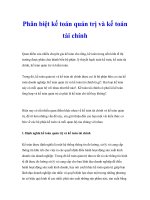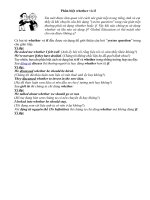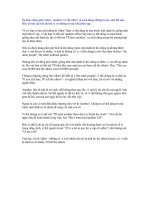phan biet all is hay all are
Bạn đang xem bản rút gọn của tài liệu. Xem và tải ngay bản đầy đủ của tài liệu tại đây (78.27 KB, 4 trang )
<span class='text_page_counter'>(1)</span><div class='page_container' data-page=1>
Welcome, <b>Guest</b>. Please login or register.
Login
December 02, 2010, 08:54:06 AM
<b>Home</b>
<b>Help</b>
<b>Search</b>
<b>Login</b>
<b>Register</b><b>Vinh English Club</b> > <b>Chia sẻ kiến thức</b> > <b>Ngữ pháp tiếng Anh</b> > <b>"All is" or "All are"?</b>
Pages: [1]
« previous next »
<b>PRIN</b>
<b>T</b>
Author Topic: "All is" or "All are"? (Read 207 times)
<b>Phú</b>
^_^
Administrator
Hero Member
Posts: 564
<b>"All is" or "All are"?</b>
« <b>on:</b> April 07, 2010, 11:39:03 PM »
<b>Every and all</b>
Why is it that words such as everybody are followed by the verb in the singular, e.g.
Everybody needs some fun? Can this rule be applied to words such as everyone,
everything?
A question concerning concord; what kind of verb goes with all. Is it singular or plural: All
is finished or All are finished?
<b>Every</b>
Every, like each, is always used with a singular noun form and therefore with a singular
verb form in English because we are counting the things or people that we are talking
about separately one by one:
* Every child in the class plays a musical instrument.
</div>
<span class='text_page_counter'>(2)</span><div class='page_container' data-page=2>
everybody / everyone / everything
It is true that everybody and everyone refers to everybody and everyone in a group of
people and everything refers to everything in a group of things. Even so, they are still
perceived individually or as a totality, so the singular verb form is still maintained:
* Is everybody happy with that? Does everyone understand my position?
* Everything she owns has been stolen.
<b>all - with singular verb forms</b>
All is more often used with plural verb forms, though sometimes it is used with singular
verbs. This happens when we are referring to all as a totality of items under
consideration. Here, all is close in meaning to everything:
* Is all well with you?
* Don't cry! All that matters is that you are safe.
* That is all she has in her suitcase: a blouse, two dresses and a pair of sandals.
* All she wants now is to get back home to her parents.
* All that happened was that she got on to the wrong train.
Note that in this sense, all is often used together with a relative that-clause, all that
matters, all she wants, etc. In your example, Ihsan, as there is no relative clause
following all, we would be more likely to say:
* Is everything finished? ~ Yes, everything is finished.
<b>All - with plural or singular verb forms</b>
However, if we wish to specify the things or people under discussion, we can use all or all
of with nouns and pronouns and the correspondingly correct singular or plural verb forms.
Compare the following:
Is everything finished?
</div>
<span class='text_page_counter'>(3)</span><div class='page_container' data-page=3>
Have all (of) the presents been distributed?
All (of) my friends have come to my party.
All of us are going to Sam's party next week. We're all going.
All of them were singing Happy Birthday.
They were all singing Happy Birthday when the lights went out.
Note from the above examples that all and all of are mainly used with uncountable (e.g.
cake) and plural (e.g. presents, friends) nouns. With personal pronouns, two realisations
are possible, e.g. all of us or we all.
all - for emphasis
Finally note that all can be used for emphasis with certain adjectives and adverbs,
prepositions and conjunctions. Here, all is close in meaning to completely:
* Your feet are all wet. Have your boots got a hole in them?
* I got scared, ran off and left her all alone.
* All around me I could hear people calling her name.
* Tell me all about your kayak trip up the estuary..
* I got sunburn and it was all because I didn't have a wide-brimmed hat.
( />
« Last Edit: April 07, 2010, 11:52:56 PM by phuong » Logged
Rock's style ^_^
<b>Phú</b>
^_^
Administrator
Hero Member
Posts: 564
<b>Re: "All is" or "All are"?</b>
« <b>Reply #1 on:</b> April 07, 2010, 11:49:32 PM »
Mình tạm thống kê lại thành thế này :
- Every (với nghĩa như each) luôn đi với is (vì là số ít)
- All (với nghĩa là tất cả) kèm với danh từ( là số nhiều) thì thơng thường đi với are
Ex : All my friends are from Vinh
</div>
<span class='text_page_counter'>(4)</span><div class='page_container' data-page=4>
của nó gần như every hơn - giống everything.)
Logged
Rock's style ^_^
Pages: [1
]
<b>PRIN<sub>T</sub></b>« previous next »
Jump to:
Powered by SMF 1.1.11 | SMF © 2006-2009, Simple Machines LLC
Dark Light MC Project by <b>SMF Arabic</b>
Coding by <b>WannaBeDie</b>
Mudim
v0.8
Tắt
VNI
Telex
Viqr
Tổng hợp
Tự động
Chính tả
</div>
<!--links-->









